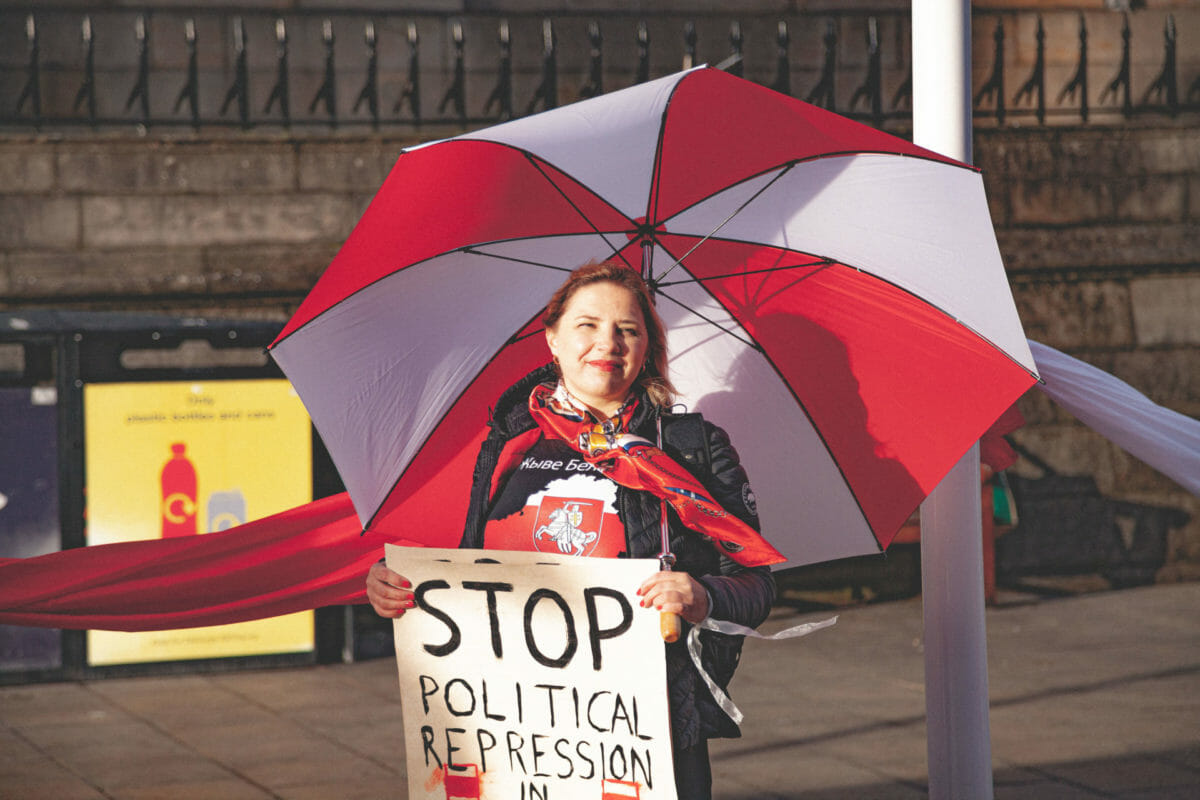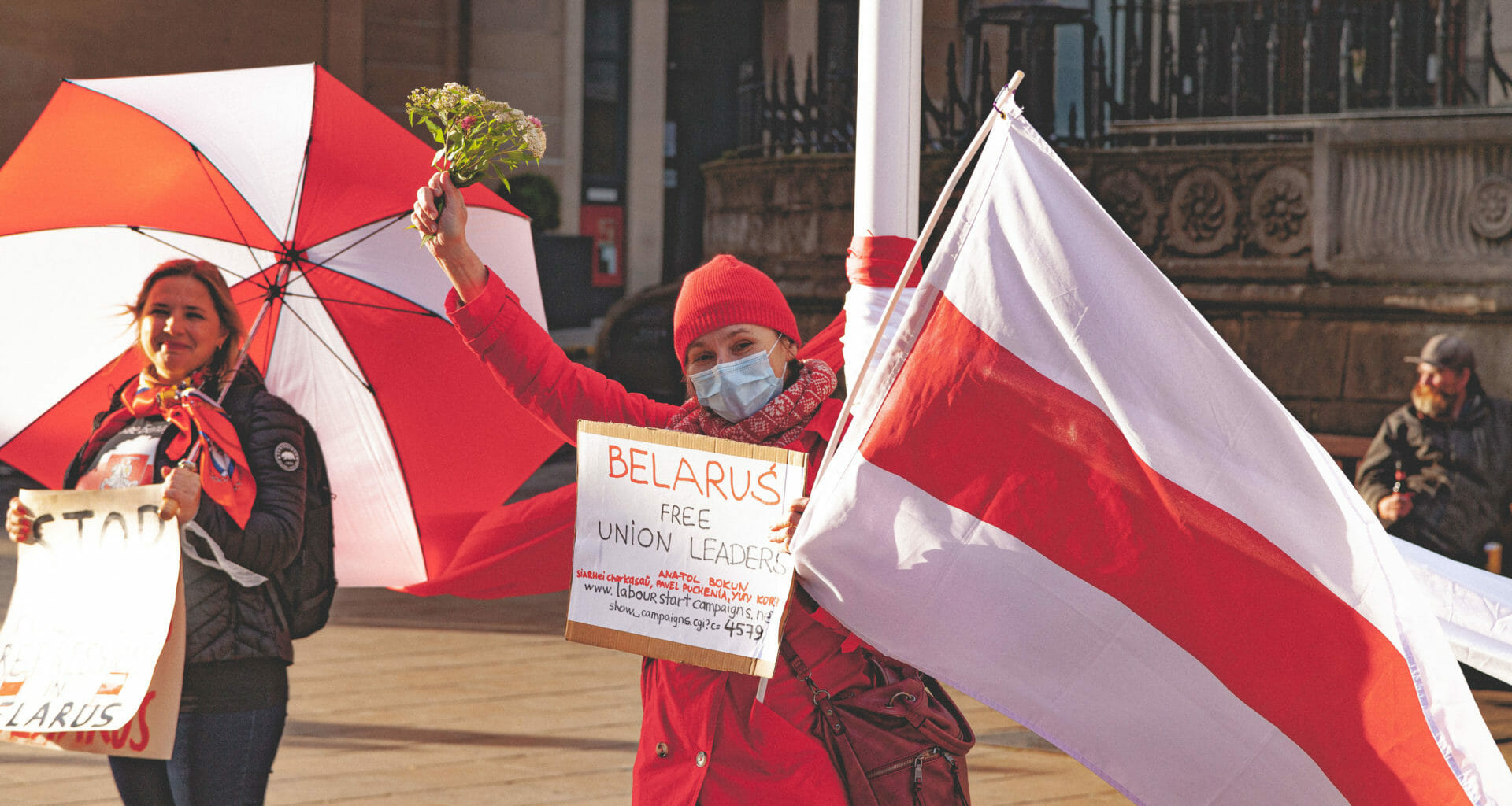Maria cried everyday throughout the summer as she read the news from Belarus on a computer at her home in Aberdeen. “I still do,” says the Belarusian scientist who came to Scotland 20 years ago to complete a PhD.
Maria – not her real name – compares the regime in Belarus to sexual violence. “It’s as if the entire country got raped, we screamed for help and no one came. We are still bleeding, our society is in agonising pain and the persecutors keep stabbing,” Maria says.
She is among dozens of Belarusians living in Scotland who watched with horror this year as the regime of President Alexander Lukashenko cracked down on political protests.
Since the nation’s disputed election in August around 25,000 people have been imprisoned in Belarusa, where police have used rape and beatings as methods of torture.
This state violence has been widely condemned across the world. In Scotland, it prompted street protests and letters were sent to both the Scottish Government and Russian consulate in Edinburgh by concerned expats seeking support for their countrymen.
We are still bleeding, our society is in agonising pain and the persecutors keep stabbing
Maria, belarus expat living in aberdeen
Maria is a critic of President Lukashenko. She grew up in the USSR, where politics were not to be spoken about unless at the dinner table with close family and friends. It was dangerous to be a dissident.
“You would hear grannies on the bus complaining about their pensions, but that was the extent of acceptable dissent,” she says.
Maria explains that not much has changed in Belarus since the fall of the former USSR, which her country was part of. “Everyone was waiting for Belarusian independence, we got this charismatic guy, Lukashenko, who came and said ‘let’s make Belarus great again’, and here we are,” she says.
Alexander Lukashenko took power as president of Belarus – known as ‘Europe’s last dictatorship’ – 26 years ago. In August this year, he commenced his sixth term in office by claiming 80 per cent of votes in the presidential election, while his opposition candidate, Sviatlana Heorhiyeuna Tsikhanouskaya, only received 10 per cent.
However, the election results were not accepted by the EU, the intergovernmental Organization for Security and Cooperation in Europe, and dozens of countries around the world.

This came as no surprise for many Belarusians, who have witnessed Lukashenko ‘winning’ over 70 per cent of votes in every election since he won power in 1994.
Svetlana McBain, a Belarusian teacher living in Scotland, describes her vote in this year’s election as “inconsequential.”
“There is no point in voting, if you vote against him, they will know, if you vote for him… well, I don’t want to do that;” she says. “The decision has been made already, he announces victory every single time, no matter what.”
After Lukashenko’s self-claimed victory, mass protests swept every major city across Belarus, which forced Tsikhanouskaya into exile in neighbouring Lithuania.
Belarusian authorities tried to supress demonstrators and, according to Human Rights Watch, those arrested were often subjected to beatings, prolonged stress positions, electric shocks, and rape – acts perpetrated by police officers and OMON-Belarusian riot police.
Earlier this month, there was public outrage after the death of 31-year old artist, Roman Bondarenko, who was thrown to the ground and beaten to death by plain-clothes police. Belarusian authorities denied the allegations, stating that he was intoxicated and had physical injuries prior to the confrontation.
This incident was condemned by the EU Council, which announced sanctions against 55 people for supporting the violent repression and intimidation in Belarus.
Despite these sanctions, the UN High Commissioner for Human Rights, Rupert Colville, reports that – at time of writing – 25,000 protestors have been detained across Belarus.
Watching their family and friends detained for protesting against president Lukashenko’s regime continues to take a toll on expats in Scotland.
One of the detainees was McBain’s brother, who was arrested in early Autumn. “He was protesting with a group of friends, then the police took him, We did not hear from him for days, we did not know what was happening, and whether he would have to face charges.”
The decision has been made already, he announces victory every single time, no matter what.
svetlana mcbain, belarusian teacher in scotland
She has already spoken to her line manager in case her brother has to go to court. “If that situation occurs, I will have to take time off work to go back to Belarus to support him,” she explains.
When McBain first heard news of her brother’s arrest, she felt she had to do something. “We wanted to let people know what was happening, it was no longer just news, it was personal,” she says.
Feeling that British media had failed to inform people about what was going on in Belarus, McBain and her husband took to the streets in Edinburgh.
“We stood in front of Nicola Sturgeon’s house, waving the Belarusian flag. Some people stopped and told us they had just been praying for us, while others had no idea where Belarus is,” she recalls.
Later that afternoon, when standing at Edinburgh’s Usher Hall, the couple noticed a police van had been following them. “We thought, ‘oh no, this can’t be happening here as well,’” she says.
“But when the policeman approached us, he asked if we were okay and if anyone had been bothering us. He told us it is our human right to protest, asked us if we wanted any pictures for social media, and gave us advice on other places where we could stand.”
McBain noted the drastic differences in approach between the two countries, and says: “While Belarusian police beats people to death, the Scottish police watched our back.”
We will continue to press the UK Government to do all it can, working with European and other international partners, to ensure that appropriate sanctions are brought to bear against those that have abused their power so badly.
Mark Cooney, Scottish PArliament International Relations Office
Soon after, she and her husband were joined by other Belarusians living in Scotland. They take to the streets every week, raising awareness of what is happening in Belarus. “Behind the statistics are our brother, sisters, and friends fighting for freedom,” says McBain.
The Belarusian diaspora has reached out to the Scottish government as well as putting pressure on the Russian consulate to support Belarusians in instilling their long-lost democracy.
While the lack of response from the Russian government was of no surprise for the Belorusian diaspora, the Scottish Government pledged their support in a letter from Mark Cooney, from the International Relations Office of the Scottish Government.
He wrote: “The Scottish government stands in solidarity with these brave people who have challenged the result of this unfair election, the official result of which we do not recognise.
“We will continue to press the UK government to do all it can, working with European and other international partners, to ensure that appropriate sanctions are brought to bear against those that have abused their power so badly; to hold those responsible to account; and ensure that the democratic will of the Belarusian people can be respected.”
Photos thanks to Maxim Oweyssi.














